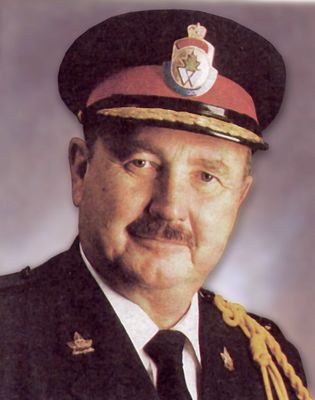Harold Basse
Harold Basse was 21-years-old when he reported for duty as a police
officer in the basement of Waterloo’s old City Hall. It was 1953, and
Basse was leaving behind a well-paying job as a meat packer to start
out in a detachment that wasn’t much bigger than a closet.
It was a risk and a huge pay cut, but the young man who would go on to become the
youngest police chief in Canada saw promise in that tiny office on Erb Street.
During his first years as a constable, Basse pursued off-hour police courses in London,
Toronto and Aylmer. When he didn’t get promoted, Basse became discouraged and
began looking for work elsewhere.
When Basse’s boss discovered that he was disillusioned, he promoted him to corporal.
Soon after, Basse made sergeant and then inspector. In 1965 he was named police chief
of the Waterloo force and in 1973, when the region consolidated its forces he became the
deputy chief under Wilfred Henrich.
Life became complicated for Basse when Henrich died suddenly and Basse was passed
over for an outsider from Toronto named Syd Brown who became the new police chief.
Brown’s tenure was mired in controversy until he was finally dismissed under allegations
of police brutality, opening the door in 1979 for Basse to become chief.
Brown fought the dismissal and so, for a while, the regional force had two chiefs – Basse,
the active chief, and Brown, inactive. Brown finally left in 1986 with a monetary
settlement.
Basse, who was born the eldest of six children on a farm near Kalstern, Saskatchewan,
started working at a young age for the Lemberg Saskatchewan Co-op. His family moved
to Kitchener after his father, a grain buyer, became ill with respiratory problems as a
result of his job. The family name – Bassendowski – was legally changed by his father.
In Kitchener, Basse delivered groceries to the country stores and then worked for J.M.
Schneider before joining the Waterloo police force.
His legacy was one of a quiet, hardworking chief who brought the force into the modern
era with computers and the new regional headquarters on Maple Grove Road.
Philosophically, he changed the way local police do their jobs by introducing the concept
of “community-based policing” and recruiting more women and visible minorities to the
force.
He was remembered as a leader who held his officers to a high standard. “He was
professional and he wanted the people working for him to be professional. But he was
also a very caring man,” said one constable.
Basse, who described himself once as a workaholic, was proud of his career but
expressed regret at not having spent more time with his three children, Debra, Mark and
Jennifer and his wife Dorothy. He retired in 1992 after experiencing some health
problems. He lived in a home on Paradise Lake, St. Clements.
When Basse died suddenly at 70 of a heart attack more than 500 people assembled at St.
John’s Lutheran Church to pay their final respects.
Photo courtesy of Chief of Police Gravill, Waterloo Regional Police Service
Harold Basse (Waterloo 150 Profile)
Description
- Creator
- Gallagher, Beth, Author
- Media Type
- Text
- Image
- Description
- To celebrate Waterloo's 150th anniversary, the Waterloo Public Library published a book called "Profiles from the Past, Faces of the Future." This book featured 150 profiles of people who helped make Waterloo what it is today. This is the digitized profile for Harold Basse
- Notes
- Please visit the Waterloo Public Library to enquire about physical copies of "Profiles from the Past, Faces of the Future."
The Waterloo 150 project was funded by a grant from the Waterloo Regional Heritage Foundation. Beth Gallagher wrote the profiles with the assistance of many research volunteers. Information for the profiles was gathered from a variety of sources from the community and the Ellis Little Local History Room. Notable sources include the Ellis Little Papers, newspaper clippings, local magazines and books. - Place of Publication
- Waterloo, Ontario
- Date of Publication
- 2007
- Subject(s)
- Personal Name(s)
- Basse, Harold ; Henrich, Wilfred ; Brown, Syd ; Basse, Dorothy, Basse, Debra ; Basse, Mark ; Basse, Jennifer
- Corporate Name(s)
- Lemberg Saskatchewan Co-Op
- Language of Item
- English
- Geographic Coverage
-
-
Ontario, Canada
Latitude: 43.4668 Longitude: -80.51639
-
- Copyright Statement
- Uses other than research or private study require the permission of the rightsholder(s). Responsibility for obtaining permissions and for any use rests exclusively with the user.
- Contact
- Waterloo Public LibraryEmail:askus@wpl.ca
Website:
Agency street/mail address:35 Albert Street, Waterloo, Ontario, Canada, N2L 5E2
- Full Text




